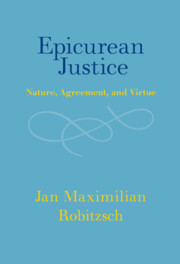Book contents
- Epicurean Justice
- Epicurean Justice
- Copyright page
- Dedication
- Contents
- Acknowledgments
- Introduction
- Chapter 1 The Origin of Justice
- Chapter 2 Contractual Justice
- Chapter 3 Aretaic Justice
- Chapter 4 Moral Psychology
- Chapter 5 Justice and Law
- Chapter 6 Ethical Naturalism
- Chapter 7 Conclusion
- Book part
- Bibliography
- Index Locorum
- General Index
Chapter 5 - Justice and Law
Published online by Cambridge University Press: 07 March 2024
- Epicurean Justice
- Epicurean Justice
- Copyright page
- Dedication
- Contents
- Acknowledgments
- Introduction
- Chapter 1 The Origin of Justice
- Chapter 2 Contractual Justice
- Chapter 3 Aretaic Justice
- Chapter 4 Moral Psychology
- Chapter 5 Justice and Law
- Chapter 6 Ethical Naturalism
- Chapter 7 Conclusion
- Book part
- Bibliography
- Index Locorum
- General Index
Summary
Modern discussions of Epicureanism often use the descriptions “legal positivism” and “natural law theory” without providing clear definitions of what is meant by these terms. This chapter remedies this deficiency by characterizing the Epicurean theory of justice and law from the perspective of contemporary philosophy of law. The first section develops a clear conceptual framework by distinguishing between different theses that characterize a view as leaning more toward legal positivism or natural law theory. The second section then tests Epicurean theory against these theses, concluding that even if the Epicurean account has some legal positivist leanings, it is overall closer to a kind of natural law theory.
- Type
- Chapter
- Information
- Epicurean JusticeNature, Agreement, and Virtue, pp. 118 - 127Publisher: Cambridge University PressPrint publication year: 2024

